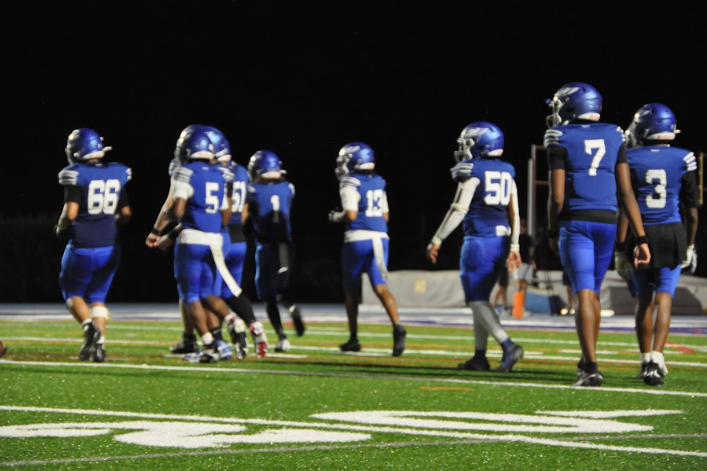Picture yourself walking to class in the Norristown hallways. Headphones in. Minding your own business. Train whistle in the distance. You think to yourself, “Why is there a train whistle in the distance?” Then you wonder, “Why is there a 6 ‘3 man yelling all of his thoughts?” And “why is he wearing running sneakers with jeans?” Well, that man would be Neil Schafer. And his 30+ years of teaching are coming to a close.
A young muscles-still-intact Schafer roamed the halls of Pottsgrove High back in the day. As his parents were both teachers there, he says, “by default, I had teaching in my blood.”
“Ever since I was five years old, I’ve really only known September to June,” Schafer stated. This means that he could hang out with his parents all the time during the summer, as they didn’t have year-round jobs.
“I’ve been doing that for the last 31 years after I graduated from college. And come September, it’ll be the first time in my lifetime, since I was basically five years old, where September will mean something different.”
Schafer first discovered his teaching prowess through a high school physics class. The original teacher left it up to the room to decide who would teach the class, as he was having trouble demonstrating the concept successfully. Knowing that both of Schafer’s parents were teachers in the building, the students all pointed at him to step up to the plate.
“They all, I guess, just assumed that I had some kind of talent, and would be able to teach them, not using teacher speak, but using student language. And they were right. I was able to. And that was the catalyst.”
In 1993, Schafer began his first year here at NAHS and first job as a teacher. He originally applied to not just Norristown, but Perk Valley, Pottsgrove, and Boyertown. Norristown ended up being the only school to offer him a job, and was the only school willing to pay him $26,000. So he took it.
“My dad wasn’t happy about that. He thought I should have waited for a better offer. And I said, ‘Dad, there’s no other offers coming. So I need to take the job.’”
Schafer reflected on his first year here at NAHS. He taught ninth grade English, and traveled around from room to room. “It was a horrible year,” he says. A large amount of his time was spent in school prepping for classes, grading papers, and getting worksheets together. He’d get here at 5:30 in the morning, and wouldn’t leave till 5:00 at night.
This excessive work and dedication stemmed from the worrisome circumstance he was in. In 1993, there were three English teachers hired on the same day, Schafer being one of them. And they were all worried that if they did something wrong, didn’t go to lunch duty, or didn’t run the classroom the way they were told, that they would be fired. This thought slithered through Schafer’s mind on a daily basis.
According to Schafer, the school told him that he had to teach a certain way, which didn’t require thinking for yourself.
“Here’s the worksheet. This is the way you teach it. This is the way it’s always been done. So don’t change it now.”
However, Schafer has always tried to paint outside these lines.
“I do my own thing. The way I want to do it.”
As an example, Schafer told me about a class activity that occurred just a couple days ago, which involved a novel. Instead of discussing its topic, Schafer brought in another piece of literature and proved his point using a “roundabout backdoor” teaching. “And I think it worked.”
Schafer believes much of this uniqueness comes from his use of outside references.
“If you talk to any of my colleagues, they’ll probably say, ‘well, most of his comments or most of his thoughts or most of his actions are not the mainstream. They’re from out of left field. They’re different.’ But that’s okay. If everybody was the same, this place would be really boring.”
Schafer believes that, in a sense, being different is what can make for a great teacher. Besides someone who is well educated and loving of their subject, Schafer believes a good teacher would be “someone who’s not afraid to take chances. Someone who respects the older teachers that have gone before them. But also is, like I said, not afraid to branch out and do their own thing. Be a little crazy. Be funny. It’s okay to laugh. It’s okay to laugh at yourself. It’s okay to not be like everybody else.”
However, Schafer’s teaching hasn’t always been the same. Schafer has seen a major change in his teaching since the age that dinosaurs roamed earth.
“I used to try to be friendly to students. And now I’m not as friendly.”
Schafer explains that he doesn’t worry much about students’ grades. While he understands that it sounds contradictory to what a teacher is supposed to do, he states, “If they don’t worry about their grades, why should I?”
“If I was an auto mechanic, and you brought your car in for a service agreement, or a service checkup, and I spent 20 hours fixing your car, you’d be like, ‘well, that’s a little bit too much for me, I’m gonna take it somewhere else.’ So you can’t fall in love too much with your students and their grades because they’re going to start to question whether you’re sincere or whether that’s normal. In other words, if you’re not going to pay attention to the way your car operates, then the mechanic should be the same way with teaching.”
Schafer believes that you get what you give. If students complain that they’re failing but sit in the back of the class sleeping, scrolling on their phone, listening to music, or just not doing work, then Schafer can’t help but let them.
“When I first started out, I thought that every kid had to pass my class. But we need losers in this world. We need the 76ers in the NBA, we need the Eagles in the NFL. If everybody was a winner, we’d be giving out 32 Lombardi trophies at the end of the football season. And we’re not doing that.”
Not only has Schafer’s teaching changed, but the state of the school around him. 30 years ago, Schafer would describe NAHS as a school with rules, regulations, and consequences. However, he believes that we’ve lost that over the years.
“I think we baby our kids too much. I think we do a disservice to them. I think down the line, that kind of babying is going to backfire in our school. And we’re already seeing some of that. We always tell the kids that we don’t think that we prepare you enough for college. And now some of the kids are coming back and saying that we gave them too many second chances. We gave them too many third and fourth chances. And that’s just not the way society is.”
He mentions a policy in which students would get 10% off of work every day it was late. But the administration doesn’t stand up to that policy anymore.
“Maybe the policy has changed, I just haven’t changed with it. I just don’t think that you can hand in something, three, four or five weeks late and think that you’re going to receive full credit. That’s not the way it works in the real world. If you have a car payment that’s due on the first of every month, and you pay it on the 15th of every month, you don’t think there’s a penalty? You don’t think the company’s not gonna say ‘hey, we’re gonna cancel your car?’ There’s got to be consequences.”
But Schafer does not only want to be negative towards Norristown, as he states some of the greatest things about being a teacher here.
“It’s mostly the students,” Schafer states. While he can’t have a single favorite student over the course of his career, he usually has around 2 or 3 per year. He also states that there were many students who weren’t necessarily his favorite, but he still had an impact on.
“I see them in the malls and I see them in shopping centers or stores and they say something like, ‘you were my favorite teacher,’ and they’ll say to you, ‘because you made learning fun.’ Okay, that’s what I remember about my teaching. That it wasn’t always serious, that it could be fun from time to time.”
He also thanks the staff members and all the other teachers here. (Even the ones who don’t like him.)
“They are the reason that you come to work every day, because of the way they treat you.”
Last June, Schafer decided that this year would be his last. But he will never forget the memories and experiences, which came from his time here at NAHS. He will remember the more little things, like chaperoning at proms, selling tickets for football games, attending Mr. Norristowns and pep rallies, or sunny day fire drills. But he will also remember the more obscure, like coaching Donna Fidler to a gold medal in the 3200 meter run for the PIAA Track and Field Championships, or attending the Dover Nascar race with former students, or saving a woman’s life in the lobby (typical Tuesday).
As Schafer may not always appreciate the state of NAHS, he concludes that “it will always be home for me and I hope to continue my contributions to the community through coaching and mentoring other teachers.”
Schafer will leave an incredible legacy, which will last as long as these walls are painted blue and white. He was crazy. He was funny. He was unpredictable. But he was a damn good teacher.















Lauren Bissland • Jun 4, 2024 at 4:56 pm
Such an amazing piece! Mr. Schafer is an inspiring teacher and is never afraid to speak up. This article made me reflect on myself as an educator and I will miss Mr.Schafer dearly!
Maria Russo • Jun 4, 2024 at 8:44 am
Very well-written, Brandon. This is a wonderful tribute to Mr Schafer, who will forever be a Norristown legend!! And those of us not yet lucky enough to be at retirement age, will continue to blow the train whistle for many years to come 🙂